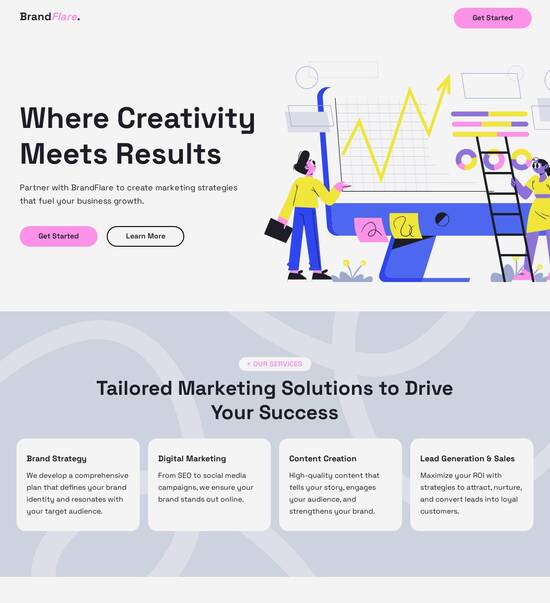
HTML page template for Translators
Use TemplateAbout template
Attract clients and showcase your skills with style using our landing page templates for Translators. Let's convert those visitors into clients!
Recommended templates

Easy to build without coding
With the intuitive drag-and-drop builder, anyone on your team can create high-converting pages without any knowledge of code or design. Make enhancements to your landing page with custom widgets using Javascript, HTML/CSS, or third-party scripts.

Multiple layouts for any industry and goal
Select from 500+ landing page layouts built to boost conversions across industry-specific scenarios. Customize them by adjusting fonts, adding images, and generating on-brand content with the AI assistant. Quickly scale with Instablocks® and Global Blocks that you can save, reuse, and update globally.

Loads fast and looks polished on any device
Every template is responsive, which means they present professionally on any device and load blazingly fast with our Thor Render Engine. You can also power them up with Google AMP technology to deliver an unparalleled mobile experience and drive higher conversions.

Robust analytics & experimentation
Get real-time updates and reporting across all your devices, showing the number of visitors, conversions, cost-per-visitor, and cost-per-lead. Launch AI-powered experiments, run A/B tests, and use heatmaps to analyze user behavior, then optimize your landing page to maximize conversions.







Easy to build without coding
With the intuitive drag-and-drop builder, anyone on your team can create high-converting pages without any knowledge of code or design. Make enhancements to your landing page with custom widgets using Javascript, HTML/CSS, or third-party scripts.
Multiple layouts for any industry and goal
Select from 500+ landing page layouts built to boost conversions across industry-specific scenarios. Customize them by adjusting fonts, adding images, and generating on-brand content with the AI assistant. Quickly scale with Instablocks® and Global Blocks that you can save, reuse, and update globally.
Loads fast and looks polished on any device
Every template is responsive, which means they present professionally on any device and load blazingly fast with our Thor Render Engine.
Robust analytics & experimentation
Get real-time updates and reporting across all your devices, showing the number of visitors, conversions, cost-per-visitor, and cost-per-lead. Launch AI-powered experiments, run A/B tests, and use heatmaps to analyze user behavior, then optimize your landing page to maximize conversions.
All the features you need to build lead-generating landing pages
Explore more featuresLearn how to build top-performing landing pages for any goal
FAQs
Leading the way in building high-performing landing pages





An all-in-one landing page and CRO platform for marketers
Instapage offers a powerful solution for building effective landing pages that accelerate your marketing efforts. With its user-friendly interface, you can create optimized pages without needing extensive coding knowledge. This guide will walk you through the steps to maximize the efficiency of your digital marketing strategies using Instapage.
Understanding the benefits of using Instapage
Instapage not only provides a robust set of tools for landing page creation but also enhances conversion rates through targeted optimization features. The platform’s flexibility allows you to create pages tailored to various market segments, ensuring your campaigns resonate effectively.
- Access to a library of over 100 high-converting templates simplifies the page creation process.
- Built-in A/B testing tools help identify which variations perform best for your audience.
- Collaboration features streamline feedback and approvals from team members and stakeholders.
Step 1: Designing your landing page
Creating your landing page starts with selecting a template that aligns with your campaign objectives. Choose from various designs that cater to different sectors, such as education or financial services. Customize text, images, and calls-to-action to ensure they speak directly to your target audience.
Step 2: Implementing optimization strategies
Utilizing Instapage's built-in tools allows you to optimize your landing page for maximum engagement. Key actions include:
- Analyzing heatmaps to see where visitors click most frequently.
- Conducting split tests to compare different content variations.
- Using personalized experiences to increase relevance for different audience segments.
Step 3: Collaborating for feedback and improvement
Collaboration plays a vital role in refining your landing page. Employ tools to gather instant feedback and make real-time edits. This seamless process ensures that your page is polished and fully aligned with your marketing strategy before launch.
In conclusion, mastering Instapage can significantly enhance your marketing efforts, enabling you to create pages that convert efficiently and effectively.
Get started with Instapage today, and transform your digital marketing campaigns into high-performing strategies that yield impressive ROI.
People also ask about HTML page template for Translators
HTML page templates for translators: Streamlining workflows and enhancing efficiency
Understanding the importance of HTML page templates in the translation industry
HTML page templates play a crucial role in the translation industry, offering translators and agencies a structured way to present multilingual content. By utilizing standardized templates, translators can ensure consistency and accuracy across different language versions, which is vital for maintaining brand identity while catering to diverse audiences. The ability to create a polished, professional web presence is significant, particularly in an era where first impressions are formed online.
Moreover, HTML templates facilitate collaboration among team members, allowing for simultaneous updates and revisions. This benefits translation agencies as they adapt to rapid changes and client requests. The importance of a well-designed HTML template extends beyond mere aesthetics; it optimizes the translation workflow, improving overall project turnaround times and client satisfaction.
The role of HTML page templates for translators
### What is an HTML page template?
An HTML page template is a pre-structured design that provides a framework for web pages, allowing for easy and efficient content placement. For translators, these templates play a vital role in ensuring that translations maintain formatting and style while adapting to different languages. Common uses for translators and agencies include developing localized marketing pages, websites, and online portfolios.
### How HTML templates facilitate translation workflows
HTML page templates enable translators to streamline their workflows by reducing redundancy. Instead of starting from scratch each time, they can utilize pre-made templates that cater to various projects. This not only saves time but also helps translators maintain consistency and high-quality outputs across multiple languages.
Key features of HTML page templates for translators
### Multi-language support
A well-designed HTML template accommodates multiple languages, allowing for seamless incorporation of various text lengths and character sets. This is particularly important for translators who work on projects that require a wide range of languages. Templates built with language compatibility in mind ensure that the content is legible and fits within the design appropriately.
### Customizable elements for client-specific needs
Adjusting template structures for unique client requests can be as simple as changing colors, fonts, or layouts. This flexibility allows translators to transform a basic layout into tailored offerings that attract and engage specific audiences across different projects.
### Integrated search feature
An efficient search feature within an HTML template greatly enhances user experience. This functionality aids translators and clients in navigating through content quickly, making information retrieval less cumbersome.
Enhanced navigation and user-friendly interface
### Intuitive navigation structures
Good design principles enhance accessibility for users by creating intuitive navigation structures. These might include clear menu organization, breadcrumb trails, and consistent layouts that help guide users through the website seamlessly. Modern approaches focus on simplicity and ease of use, often contrasting with older designs that may confuse users.
### Responsive interface for various devices
As more users access content on mobile devices, having a responsive interface is crucial. Templates should be designed to function seamlessly across various screen sizes. Best practices include using flexible grids and layouts, ensuring text can be read easily regardless of device.
Optimizing data transmission in the translation process
### Streamlined data flow for client information
Effective communication between agencies and clients is essential for successful project management. HTML templates designed with data capture mechanisms ensure that client information is organized and easily accessible. This enables translators to focus on content rather than administrative tasks.
### Security features for safe data handling
Confidentiality is paramount in the translation industry. HTML templates should include security measures such as encryption and data protection protocols, ensuring that sensitive client information remains secure during transmission.
Customization: Tailoring templates to fit language needs
### Creating language-specific variations
Creating distinct language versions of a template requires attention to detail. Practically, this means accommodating variations in layout sizes and formats, such as different date formats, currencies, and character distinctions when adapting content for international markets.
### Incorporating cultural elements into web templates
Understanding the cultural context is essential for any translation project. Localized visual designs that reflect cultural preferences and norms can significantly enhance user engagement. Whether it's color significance or imagery that resonates with local audiences, cultural relevance should be a foundational aspect of template design.
Collaborative features for translation agencies
### Facilitating team collaboration through templates
Templates designed for collaborative work can include tools that allow multiple translators to make real-time changes. This not only speeds up the production process but also enables feedback loops that enhance the quality of the final output.
### Managing client queries efficiently
A well-structured template may also incorporate features for tracking client queries. Effective management tools can help agencies to respond promptly, ensuring client satisfaction and improving overall communication.
Platforms and tools supporting HTML template development
### Recommended platforms for template creation
There are numerous platforms available for creating HTML templates that cater to translators, each with its own set of features and usability. Popular options include WordPress, Wix, and custom frameworks like Bootstrap, enabling users to select a tool that meets their specific needs and technical expertise.
### Integrating API solutions for enhanced functionality
Integrating third-party APIs can significantly enhance the capabilities of HTML templates. These integrations support numerous functionalities, including analytics, data storage, and even payment processing, streamlining workflows for translation agencies.
Case studies: Success stories of tailored HTML templates in translation
### Interpretation of specific client scenarios
Many translation agencies have seen enhanced client satisfaction through the use of customized HTML templates. For instance, one agency tailored its templates for a client in the tourism sector, scaling its web content for multiple languages, which resulted in a significant increase in user engagement and bookings, showcasing the impact of properly executed customization.
### Analyzing template utilization across various language projects
When comparing standardized templates to personalized ones, agencies have noted a difference in project delivery speed and client feedback quality. Custom versions tend to perform better in areas such as client satisfaction and repeat business, demonstrating the value of adapting templates to fit the project and client needs.
Challenges and solutions in implementing HTML templates for translators
### Common pitfalls in template design and usage
Translation agencies often face challenges when utilizing HTML templates, from design misalignments to inflexibility in adapting to specific needs. Identifying and understanding these obstacles is the first step toward enhancing the user experience and producing better results.
### Future trends in HTML templates for the translation sector
Looking ahead, advances in technology will likely shape how HTML templates are designed. Innovations such as artificial intelligence and machine learning can enhance how templates learn from usage patterns, potentially revolutionizing template effectiveness and user interaction.
Ready to skyrocket conversions?
Supercharge your ad campaigns with high-performing landing pages
Get started














